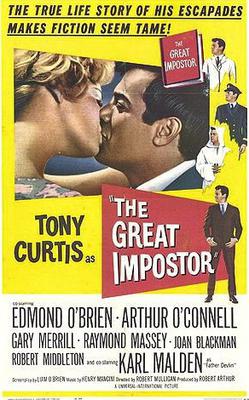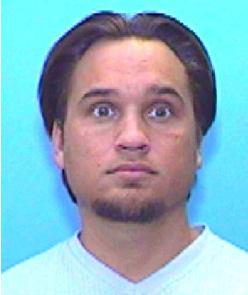
An advance-fee scam is a form of fraud and is one of the most common types of confidence tricks. The scam typically involves promising the victim a significant share of a large sum of money, in return for a small up-front payment, which the fraudster claims will be used to obtain the large sum. If a victim makes the payment, the fraudster either invents a series of further fees for the victim to pay or simply disappears.

A scam, or confidence trick, is an attempt to defraud a person or group after first gaining their trust. Confidence tricks exploit victims using a combination of the victim's credulity, naïveté, compassion, vanity, confidence, irresponsibility, and greed. Researchers have defined confidence tricks as "a distinctive species of fraudulent conduct ... intending to further voluntary exchanges that are not mutually beneficial", as they "benefit con operators at the expense of their victims ".

Catch Me If You Can is a 2002 American biographical crime comedy-drama film directed and produced by Steven Spielberg and starring Leonardo DiCaprio and Tom Hanks with Christopher Walken, Martin Sheen, Nathalie Baye, Amy Adams, and James Brolin in supporting roles. The screenplay by Jeff Nathanson is based on the semi-autobiographical book of the same name by Frank Abagnale Jr., who claims that prior to his 19th birthday, he successfully performed cons worth millions of dollars by posing as a Pan American World Airways pilot, a Georgia doctor, and a Louisiana parish prosecutor. The truth of his story is heavily disputed.

Frank William Abagnale Jr. is an American security consultant, author, and convicted felon who committed frauds that mainly targeted individuals and small businesses. He later gained notoriety in the late 1970s by claiming a diverse range of workplace frauds, many of which have since been placed in doubt. In 1980, Abagnale co-wrote his autobiography, Catch Me If You Can, which built a narrative around these claimed frauds. The book inspired the film of the same name directed by Steven Spielberg in 2002, in which Abagnale was portrayed by Leonardo DiCaprio. He has also written four other books. Abagnale runs Abagnale and Associates, a consulting firm.
Cheque fraud, or check fraud, refers to a category of criminal acts that involve making the unlawful use of cheques in order to illegally acquire or borrow funds that do not exist within the account balance or account-holder's legal ownership. Most methods involve taking advantage of the float to draw out these funds. Specific kinds of cheque fraud include cheque kiting, where funds are deposited before the end of the float period to cover the fraud, and paper hanging, where the float offers the opportunity to write fraudulent cheques but the account is never replenished.
Email fraud is intentional deception for either personal gain or to damage another individual using email as the vehicle. Almost as soon as email became widely used, it began to be used as a means to defraud people, just as telephony and paper mail were used by previous generations.
Steven Jay Russell is an American con artist, known for escaping from prison multiple times.

The Great Impostor is a 1961 American comedy-drama film based on the story of an impostor named Ferdinand Waldo Demara. Loosely based on Robert Crichton's 1959 biography of the same name, it stars Tony Curtis in the title role and was directed by Robert Mulligan. The film only generally follows Demara's real-life exploits, and is much lighter in tone than the book on which it is based.
Great Meadow Correctional Facility is a maximum security prison in New York State in the United States. The prison is in Comstock, a hamlet right outside of the village of Fort Ann in Washington County, New York. As of September 3, 2008 it was home to 1,663 inmates. When Great Meadow opened in 1911 it was the fourth prison for adult males constructed in the state of New York.

Matthew Bevan "Matt" Cox is an American former mortgage broker and admitted mortgage fraudster. Cox, also a true crime author, wrote an unpublished manuscript entitled The Associates in which the main character traveled the country to perpetrate a mortgage fraud scheme similar to the one Cox ran.
Lester Knox Coleman III was an American who was the co-author of the 1993 book Trail of the Octopus: From Beirut to Lockerbie – Inside the DIA, in which he claimed that a secret drug sting enabled terrorists to evade airport security in the 1988 terrorist bombing of Pan American World Airways Flight 103. Coleman claimed he was at one point employed by the United States Drug Enforcement Administration (DEA). Coleman further alleged that a compromised American covert drug-operation allowed Iranian-backed terrorists – the PFLP-GC, led by Ahmed Jibril – to slip a Semtex bomb aboard the plane. On September 11, 1997, Coleman stated to a New York Federal court that "...he lied when he claimed that a secret drug sting enabled terrorists to evade airport security in the bombing..." In a plea agreement, Coleman was sentenced to time served, which was five months, and six months' home confinement under electronic monitoring. Conspiracy theories alleging that the federal convictions of Lester Coleman were an effort to silence him and to hide the truth about Pan Am Flight 103 circulated around the internet.

Catch Me If You Can is a musical drama with a libretto by Terrence McNally and a theatrical score by Marc Shaiman and Scott Wittman. It follows the story of a con artist named Frank Abagnale. A majority of the plot is borrowed from the 2002 film of the same name, which in turn was based on the 1980 autobiography of the same name by Abagnale and Stan Redding.
This is a list of fictional portrayals of confidence tricks found in television and the movies.
Natwarlal was an Indian fraudster known for his high-profile crimes and prison escapes, including having supposedly repeatedly "sold" the Taj Mahal, the Red Fort, the Rashtrapati Bhavan, and the Parliament House of India.

Neal George Caffrey is the main character of the USA Network original series White Collar. Neal is a criminal consultant for the White Collar Crime Division of the FBI in New York City. He is a world-class forger and conman, with a fondness for art, fine wine, Sy Devore suits, fedoras, and beautiful women. Neal speaks eight languages, including conversational Swahili, and has 27 known aliases.
Joseph Gerald Shea was an American law enforcement official who was a Special Agent for the U.S. Federal Bureau of Investigation (FBI).

Sleeping Beauties is a novel by Stephen King and his son Owen King, released on September 26, 2017. The book was first mentioned during a promotional appearance on the CBC radio program q. Of the novel, Stephen King stated, "Owen brought me this dynamite idea and I've collaborated a couple of times with Joe. I'm not going to say what the idea is because it's too good."

The "Con Queen" scam is a long-running and elaborate scam perpetrated by the so-called Hollywood Con Queen, an Indonesian impostor named Hargobind Punjabi Tahilramani who was eventually found and arrested. The con, which was successfully operated for several years, targets entertainment industry gig workers, who travel to Indonesia believing that they have been recruited to work on the production of a film or television show.










